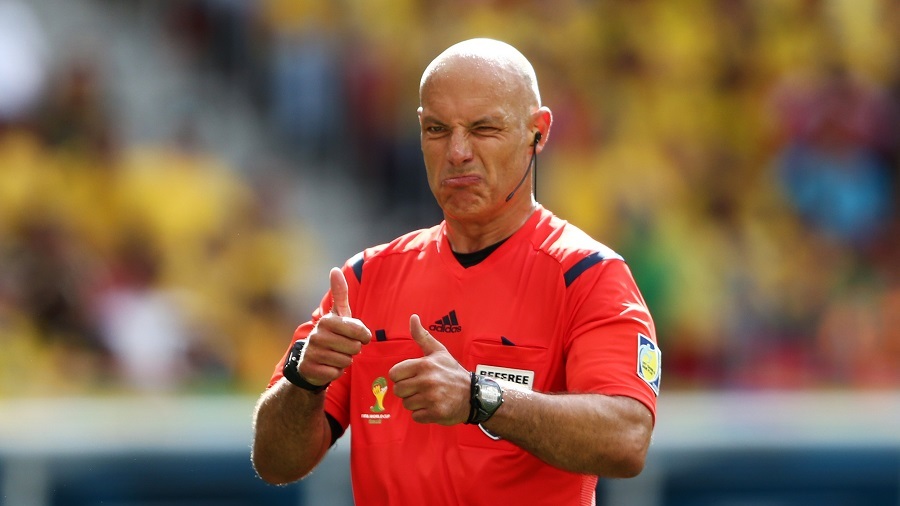- Premier League
Claiming Webb was biased towards United is ridiculous

After 25 years of looking stern, Premier League referee Howard Webb has hung up his whistle to pursue a new career in the upper echelons of officialdom.
Like his fellow shiny-headed disciplinarian, Pierluigi Collina, Webb was always a good barometer of the importance of a football match. He was, as the broadcasters tended to burble, "the big referee for the big occasion!" But while they burbled, he brooded, always wearing that stony face that seemed to say, "I will not lose my temper with you, but know that if I did, you would regret it. For I could kill you with my thumb."
Former Premier League referee Dermot Gallagher knew Webb when he began his refereeing career and he was immediately impressed. "I was very taken with his diligence," said Gallagher. "I knew what it took to make it to the top, and you always knew that he would make a top referee. He knew how to deal with people, and he took that onto the pitch."
Yet for all this, Webb's reputation - including officiating over countless high-profile Premier League games, the 2009 FA Cup final and the the 2010 Champions League final - was marked by two blemishes. The first was his controversial performance in the 2010 World Cup final. The other was the relentless assertion that he supported Manchester United.
The accusations of favouritism were always ridiculous, though they continued to gain momentum throughout his career. It didn't matter that the smears failed to stand up to even the most basic level of scrutiny; every week, someone Photoshopped a United shirt on Webb's torso and the retweet counter whirled in gratitude. With every contentious decision - and, indeed, with every clearly justifiable decision - those images multiplied and spread, including one notable effort from former Liverpool player Ryan Babel that earned him a £10,000 fine.
An example of the response suggests the idea resonated with some fans:
One of the first things that comes up when you search Howard Webb. Ryan Babel you're a genius. pic.twitter.com/Q36APYSxEy
— Thomas Ritchie (@tom_lfc_19) February 19, 2014Rival supporters may very well have complained that United always seemed to win when Webb was officiating (they didn't, they won a mere 61.7 percent of the time), but that was obviously less to do with Webb and more to do with the fact that United were really good at football. It didn't matter who was refereeing; United would still be likely to win the game. They won more penalties than they conceded because they spent most of their time running with purpose into the opposition's penalty area.
"I have no idea where [that perception] came from," said Gallagher. "This is a guy that everyone knows was a Rotherham fan, he grew up in Rotherham and he watched them regularly. But this is the nature of the beast. As the referee, sometimes you just have to accept what comes with it. You just don't let it worry you."
After the 2010 World Cup final, Webb felt the sting of international controversy when he was heavily criticised for his handling of the occasion; in particular, his failure to dismiss Nigel de Jong for attempting to kick Xabi Alonso's lungs through his shoulder blades.
"When you're a football referee in the heat of battle - and that was a battle - things happen that you don't see," said Gallagher. "Alonso's body was actually blocking the view of De Jong's tackle because Howard was smack behind him. Now that's not an excuse, but sometimes you don't see it clearly. What I would say is that if you're going to give a straight red card in a World Cup final, you want to be absolutely sure you're right. You're not going to take a guess."
"He could have handled the game differently, but then he would have had different reactions. I remember watching the pundits at half-time and they were referring to different tackles and different challenges, they were saying they wanted red cards for this, and red cards for that. At the end of the day, he controlled what I think was one of the most difficult football matches I have ever seen."
Webb's decision to stay in officiating, working as a technical director to the next generation of whistlers - not only helping to develop up-and-coming officials, but offering his expertise to the media - is to be commended. Even if you do insist on believing that he kisses a Wayne Rooney poster before going to sleep at night, there's no question that his experience is invaluable to the game.
But will Webb miss it all? After all, refereeing is an awful job, isn't it?
"No!" says Gallagher. "I cannot agree with that. It was the greatest job I ever had. It gave me the greatest pleasure. It gave me three things I would never have had without it: tremendous self-confidence, tremendous strength of mind and it gave me tremendous health. I'm 57 now and I'm still as fit as I was when I was a professional. I can still get up in the morning, run five miles and feel good."
Something for Webb to ponder, perhaps, as he begins his new life away from the limelight.
This article first appeared on ESPNFC

